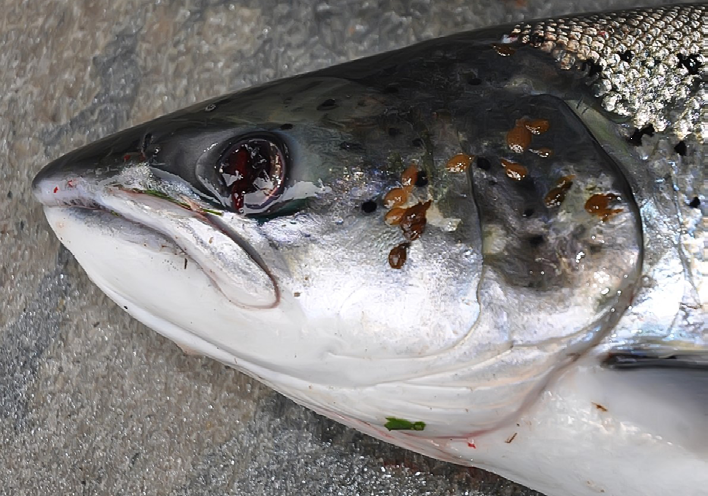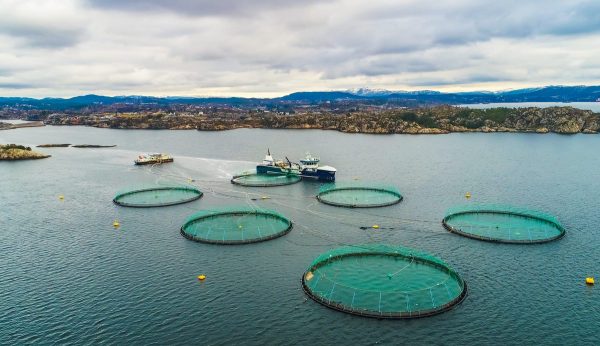Initial objection to decision to grant a licence to Marine Harvest for Shot Head, Bantry Bay.
Bantry Bay Salmon Farming
The farming of salmon within Bantry Bay is in existence since the early 1980's. Bantry Bay salmon farming has been a continuous source of controversy with objections from local fishermen, local and national Non Government Organisations. The near extinction of sea trout is one of the most visible consequences of this industry within Bantry Bay. Atlantic salmon stocks are also negatively affected with very poor stocks evident within the rivers flowing into Bantry Bay.

Open net technology is both outdated and harmful. Wild salmon and seatrout are harmed by this technology. This technology does not protect farmed fish from disease, parasites or an increasing incidence of harmful algal blooms or jellyfish invasion. Semi closed containment will address these issues.
An expansion to salmon farming was applied for by MOWI at a site within the Bay (Shot Head). The licence was awarded by the Minister of Agriculture, Food and Marine for the Shot Head site.
Salmon Watch Ireland started the appeal process to the Aquaculture Licence Appeal Board (ALAB).This process is ongoing and is not expected to be finalised for a considerable period. Overall the licence application process is now live for over 8 years. Here under the submissions and other relevant documents are available.
Shot Head Appeal - Salmon Watch Ireland
Salmon Watch Ireland Limited (‘SWIRL’) is a not-for-profit membership organisation dedicated to the restoration of wild salmon abundance. It is SWIRL’s position that open-cage salmon farming is inherently damaging to sea-migrating wild salmonids, Atlantic salmon and sea trout, and has proved to be so in Norway, Scotland and Ireland.
In addition there are other significant environmental threats associated with open- cage farming. In the view of SWIRL, and many others here and internationally, it is only through conversion to closed containment systems, whether on land or in the sea, that can fully mitigate the hugely negative impacts flowing from current systems of salmon farming.
There are now marketable quantities of closed containment salmon being produced on both sides of the Atlantic and the Norwegian government has committed to closed containment for further expansion of its industry.
Nonetheless, Ireland has a salmon farming industry which the Government is intent on expanding using current, out-dated technology with all its’ dangers. Without prejudice to its opposition to open-cage salmon farming, therefore, SWIRL is obliged to put forward observations designed to mitigate the damage caused, particularly to wild salmonids, by existing and new installations.
The observations that follow should be seen in that light.
Oral Hearing and Documents Submitted
Oral Hearing : Bantry Bay Salmon Farming Licence Application
Salmon Watch Ireland along with other NGO'S were granted an oral hearing into the decision to award an aquaculture licence to Marine Harvest for the Shot Head site in Bantry Bay.
The hearings took place in Bantry in February and September 2017. The following is a schedule of all documents from all parties. There is also a transcript of the oral hearing.
A number of matters arose during the Oral Hearings and Marine Harvest (MOWI) were required to furnish under Section 47 of the Fisheries Act a supplementary EIS in relation to two issues:
Issue 1.The risk (i.e. posed by the proposed salmon farm installation) of sea-lice infestation of wild salmonids migrating from/to the Dromogowlane and Trafrask rivers and any resulting implications for local freshwater pearl mussel (FPM) populations.
Issue 2.The impact of salmon farm waste on water quality in Bantry Bay, having regard tothe maintenance of 'good water status' as required under the Water Framework Directive.

Sea Lice distribution within the Bay has been modeled by Marine Harvest. This model is completely incorrect as witnessed by studies carried out by the Central and Regional Fisheries Boards. EIS must be totally undermined as a result of this.
Here under please find EIS as presented by Marine Harvest and reply submitted by Salmon Watch Ireland:
Sea Lice : Distribution Model - Not Fit for Purpose
Salmon Watch Ireland responded to the supplementary EIS and concentrated on the issue of the risk (i.e. posed by the proposed salmon farm installation) of sea-lice infestation of wild salmonids migrating from/to the Dromogowlane and Trafrask rivers and any resulting implications for local freshwater pearl mussel (FPM) populations.
Salmon Watch Ireland was able to prove that the modelling of sea lice larval dispersal was incorrect. This was facilitated by previous sea lice research in Bantry Bay by the South Western and Central Fisheries Boards (Now IFI).
Salmon Watch Ireland was able to demonstrate that larval lice could infest sea trout in the Adrigole River as the research noted. The model from Marine Harvest sought to demonstrate that lice larvae could not penetrate this estuary and is therefore incorrect as physical evidence proves heavy infestations.
Any attempt to grant a licence based on such modelling cannot be contemplated by ALAB.
Here under reply to Supplementary EIS.

